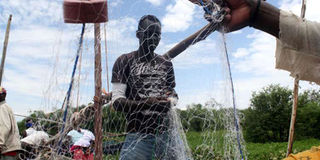Stop demonising Chinese and manage Lake Victoria better

A fisherman prepares a net for fishing in Lake Victoria on April 5, 2016. PHOTO | TOM OTIENO | NATION MEDIA GROUP
What you need to know:
Instead of getting angry with China, the leadership of the East African Community should recognise its own shortcomings.
While pledging to change tack in order to provide inspirational leadership for unlocking the vast potential of Lake Victoria and uplift the living standards of the people, the authorities should, beat their chests in supplication and, like Shakespeare’s character, admit that, “the fault, dear Brutus, is not in our stars, but in ourselves that we are underlings”.
The recent row over fish imports from China raises concern about the management of the fishing industry on Lake Victoria; and the conduct of the international trade and investments cooperation among the East African Community (EAC) partners.
In particular, it concerns their relations with China, the world’s largest economy and biggest trader. China’s trade contacts with East Africa are the oldest, dating back to the 6th Century, and there is plain evidence of a vibrant Chinese investment activity, covering some areas of greatest importance and strategic value for regional development, yet the relations with China remain the most misunderstood and maligned.
The Chinese are cast as the new ogres out for all mischief against the hapless East Africans, from purveying of sub-standard, fake or counterfeit goods, to milking Africa of its natural resources. The negative profiling is tightly embraced despite the benefits that the region derives in the more affordable and appropriate Chinese technology, from cheaper electronic and textile goods to mobile phones, farm implements, and building construction materials to roads everywhere.
The East Africans remain adamant, largely hostile and conceptually unappreciative of the deep roots and strategic value of EAC-China co-operation.
The surge of globalisation through the 1990s and the dawn of the 21st century drew China and the EAC countries closer under the agitations for fair trade and equitable development in the increasingly interdependent world economic system. When EAC’s “traditional trade partners”, the former colonial powers and World Bank prevaricated, China stepped up with investments in the region’s roads and railways.
REVIEW PERFORMANCE
Kenya’s row over the Chinese fish imports comes at a time when the EAC needs to review the performance of its trade agreement with China over the past 5 years to get out the lessons learnt and steps to rectify its hefty unfavourable terms of trade.
Kenya, for example, imported goods worth Sh248.6 billion in 2015 from China compared to exports worth of only Sh6.6 billion. The fish trade war provides an ideal case of study in the search for effective development cooperation among China and her EAC partners. As the Chinese saying goes, “give a man fish, and you feed him for a day; show him how to catch fish, and you feed him for a lifetime”.
Apart from establishing the Lake Victoria Development Programme in 2001 (later upgraded to Lake Victoria Basin Commission in 2005), EAC authorities proceeded to neglect completely any practical commitment to “joint development” of Lake Victoria. All that one observed was the escalation of conflicts and rivalries among the partner States, over imaginary colonial boundaries and Migingo islands; and they would neither rest nor relent while they chased the poor fisher folk around, from one corner to the other of their “sovereign” portions of the lake.
The neglect of the fisher folk and their livelihoods intensified to the extent that today the lake faces unprecedented levels of pollution; 95 per cent of the Nile perch is harvested prematurely; the fish stock is severely depleted; Kenya now faces a shortage of 800,000 tonnes of fish; and the ordinary household in the Lake region can no longer afford to put its staple fish dish on the table.
The importation of cheaper, more affordable fish from China to feed the people has not been the cause of the mismanagement of the fishing industry in Lake Victoria. Rather, it is the effect of it.
Instead of getting angry with China, the EAC leadership should recognise its own shortcomings, and, while pledging to change tack in order to provide inspirational leadership for unlocking the vast potential of Lake Victoria and uplift the living standards of the people, the authorities should, beat their chests in supplication and, like Shakespeare’s character, admit that, “the fault, dear Brutus, is not in our stars, but in ourselves that we are underlings”.
Magaga Alot is a corporate communication consultant; [email protected].




